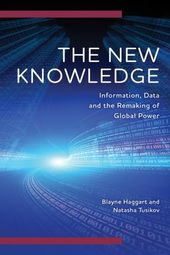
Knowledge-Driven Power in a Digitized World
Who holds, controls, and creates power in contemporary societies? On the occasion of their new book, The New Knowledge: Information, Data and the Remaking of Global Power, Blayne Haggart and Natasha Tusikov will present their answer to this question. They will take us along from Google’s Internet-of-Things projects, new modes of property and knowing that arose during the Covid-19 pandemic, and the ideology through which power is exercised.
The world’s knowledge is increasingly generated, stored, and accessed through digital means. How does this change the roles of who gets to say what is correct and who has access to data and knowledge? How does this change what expertise is, who becomes an arbiter of truth, and who gets to access information?
In their new book The New Knowledge: Information, Data and the Remaking of Global Power, which is available free of charge online under a creative commons license, renowned scholars Blayne Haggart and Natasha Tusikov show how power is exercised in a world of data.
This evening will be a book presentation, followed by a discussion with scholars Joris van Hoboken and Marta Morvillo. The debate will take us along the topics of knowledge governance, intellectual property, the Internet of Things, and the role of expertise.
About the speakers
Blayne Haggart is an associate professor of political science at Brock University in St. Catharines, Canada. Dr. Haggart’s research focuses on the international political economy of knowledge, particularly intellectual property rights, data governance and internet governance.
Natasha Tusikov, assosciate professor at York University, researches at the intersection among law, crime, technology, and regulation. She is a senior fellow at the Balisillie School of International Affairs in Waterloo, Canada and a visiting fellow with the Justice and Technoscience Lab (JusTech Lab), School of Regulation and Global Governance (RegNet) at the Australian National University.
Joris van Hoboken is a Professor of Law in the Brussels School of Governance’s LLM programme. He is an Associate Professor at the Institute for Information Law (IViR) at the University of Amsterdam. He is also affiliated with the Interdisciplinary Research Group on Law Science Technology & Society (LSTS). Van Hoboken works on the intersection of fundamental rights protection (data privacy, freedom of expression, non-discrimination) and the governance of platforms and internet-based services.
Marta Morvillo is Assistant Professor in European Legal and Economic Governance at the Department of European Studies, University of Amsterdam. Her research lies at the interface of EU law, constitutional law, and expert governance. Before joining the UvA, she was Emile Noël fellow at the NYU Law School (2020-2021) and Adjunct professor in Constitutional adjudication at the University of Bologna (2021).
Niels ten Oever is Assistant Professor at the European Studies department and co-principal investigator with the critical infrastructure lab at the University of Amsterdam. Next to that, he is a visiting professor with the Centro de Tecnologia e Sociedade at the Fundação Getúlio Vargas. His research focuses on how norms, values, and ideologies get inscribed, resisted, and subverted in communication infrastructures through their transnational governance.

:rgb(-15)

:rgb(-25)

:rgb(8)

:rgb(10)
